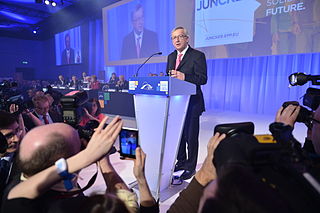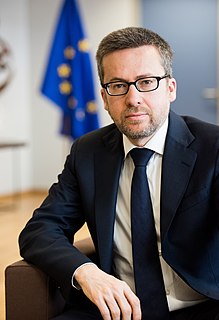The following list outlines the structure of the federal government of Canada.
Innovation, Science and Economic Development Canada, or ISED, formerly Industry Canada, is the department of the Government of Canada with a mandate of fostering a growing, competitive, and knowledge-based Canadian economy. ISED specifically supports Canadian innovation efforts, trade and investment, enterprise growth, and customized economic development in Canadian communities.

The European Research Council (ERC) is a public body for funding of scientific and technological research conducted within the European Union (EU). Established by the European Commission in 2007, the ERC is composed of an independent Scientific Council, its governing body consisting of distinguished researchers, and an Executive Agency, in charge of the implementation. It forms part of the framework programme of the union dedicated to research and innovation, Horizon 2020, preceded by the Seventh Research Framework Programme (FP7). The ERC budget is over €13 billion from 2014 – 2020 and comes from the Horizon 2020 programme, a part of the European Union's budget. Under Horizon 2020 it is estimated that around 7,000 ERC grantees will be funded and 42,000 team members supported, including 11,000 doctoral students and almost 16,000 post-doctoral researchers.

The Joint Research Centre (JRC) is the European Commission's science and knowledge service which employs scientists to carry out research in order to provide independent scientific advice and support to EU policy.
The JRC is a Directorate-General of the European Commission under the responsibility of Tibor Navracsics, Commissioner for Education, Culture, Youth & Sport. The current Director General of the JRC is Vladimír Šucha. Its Board of Governors assists and advises the Director-General on matters relating to the role and the scientific, technical and financial management of the JRC.

The Engineering and Physical Sciences Research Council (EPSRC) is a British Research Council that provides government funding for grants to undertake research and postgraduate degrees in engineering and the physical sciences, mainly to universities in the United Kingdom. The head office is in Swindon, Wiltshire in the same building that houses the AHRC, BBSRC, ESRC, MRC, Natural Environment Research Council, Science and Technology Facilities Council, TSB, Research Councils UK and the UK Space Agency.

The Directorate-General for Research and Innovation is a Directorate-General of the European Commission, located in Brussels, and responsible for the European Union's research and innovation policy and coordination of research and innovation activities. It is headed by Commissioner Carlos Moedas and Director-General Jean-Eric Paquet.
The European Institute of Innovation and Technology (EIT) is an independent EU Body, headquartered in Budapest, Hungary. It was established on 11 March 2008.
The Commissioner for Education, Culture, Multilingualism and Youth is a member of the European Commission.

The Commissioner for Justice, Consumers and Gender Equality is a post in the European Commission. The current commissioner is Věra Jourová.

The Commissioner for Industry and Entrepreneurship is a Vice-President of the European Commission. The current commissioner is Jyrki Katainen.
The Advisory Council for Aeronautics Research in Europe (ACARE) is a European advisory body that aims to improve the competitiveness and sustainability of the European Union in the field of aeronautics. It is a public-private partnership between the Directorate-General for Transport and Energy of the European Commission and industry leaders. ACARE was launched at the Paris Airshow in June 2001 and has about 40 members.
Europe's achievements in science and technology have been significant and research and development efforts form an integral part of the European economy. Europe has been the home of some of the most prominent researchers in various scientific disciplines, notably physics, mathematics, chemistry and engineering. Scientific research in Europe is supported by industry, by the European universities and by several scientific institutions. The raw output of scientific research from Europe consistently ranks among the world's best.

The Juncker Commission is the European Commission in office since 1 November 2014 and is due to serve until 2019. Its president is Jean-Claude Juncker, who presides over 27 other commissioners. In July 2014, Juncker was officially elected to succeed José Manuel Barroso, who completed his second five-year term in that year.
The European Innovation Council (EIC) is a proposal of a council with the mission of supporting the commercialization of technologies in the European Union. In its latest form, the concept has been put forth by the EU Research Commissioner Carlos Moedas in mid-2015. Similar proposals were presented over the years, including by Hans Wigzell in 2002, and by the European Association of Research and Technology Organisation (EARTO) in 2010.
Horizon Europe is a planned 7-year European Union scientific research initiative meant to succeed the current Horizon 2020 program. The European Commission drafted and approved a plan for the Horizon Europe to raise EU science spending levels by 50% to approximately €100 billion over the years 2021-2027. Independent observers predict the final approved funding will be much lower after lengthy negotiations with the European Parliament and EU member states are completed. Over the past few years EU commissioner Carlos Moedas, along with many advocacy groups, have tried to push for a more expansive EU science budget. In order to build political support for the budget increase, he intends to use American originated ideas of "moonshots" to focus research efforts and boost the public interest.
Kinga Stanislawska is an early stage VC investor and the founder of Experior Venture Fund. She comes from Warsaw, Poland.

The Scientific Advice Mechanism is a service created by the European Commission which provides independent science advice directly to European Commissioners to inform their decision-making. The Mechanism consists of two parts: the Group of Chief Scientific Advisors, an expert group consisting of up to seven leading scientists, and SAPEA, a consortium of five European Academy Networks collectively representing around 100 academies and learned societies across Europe.










